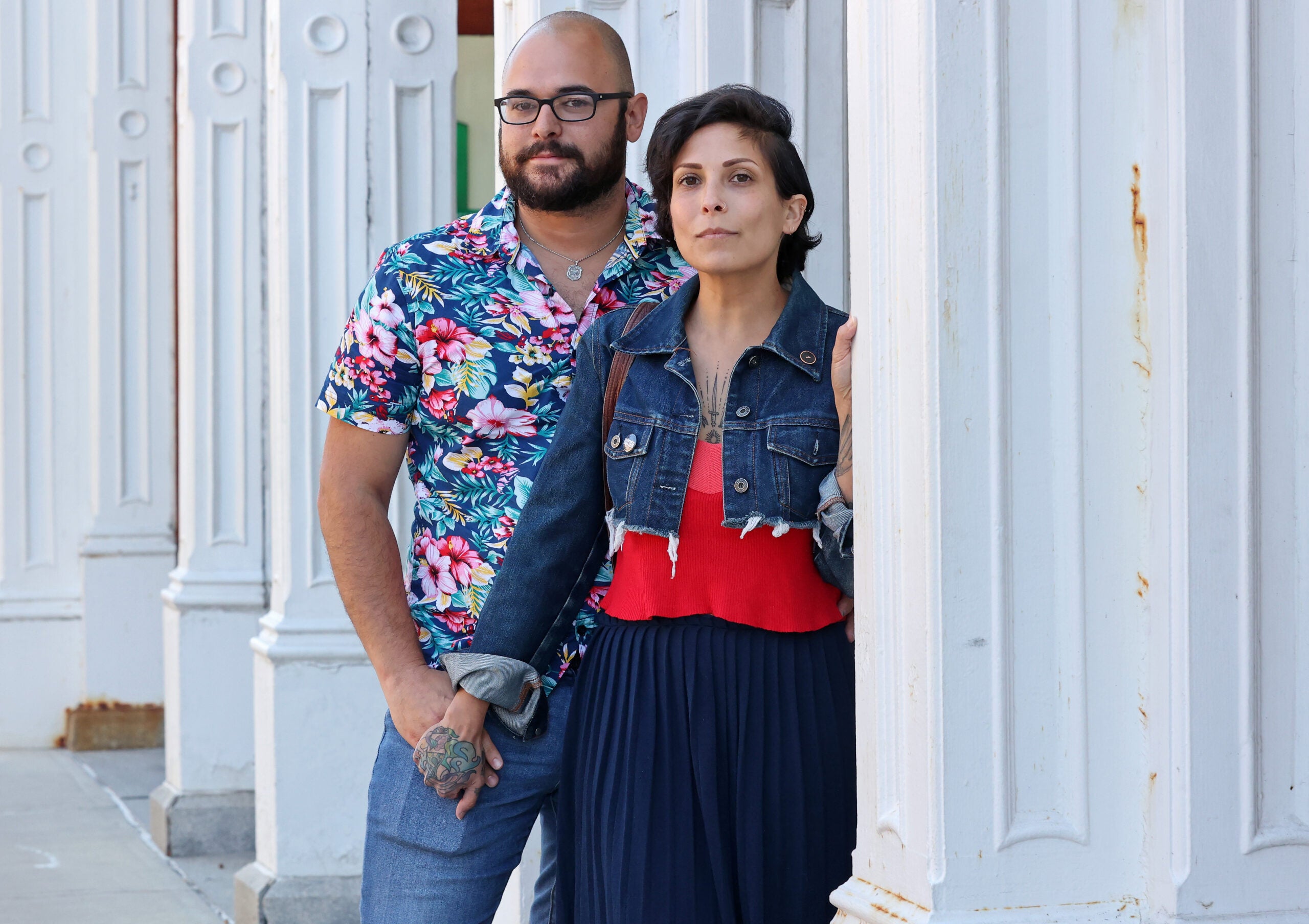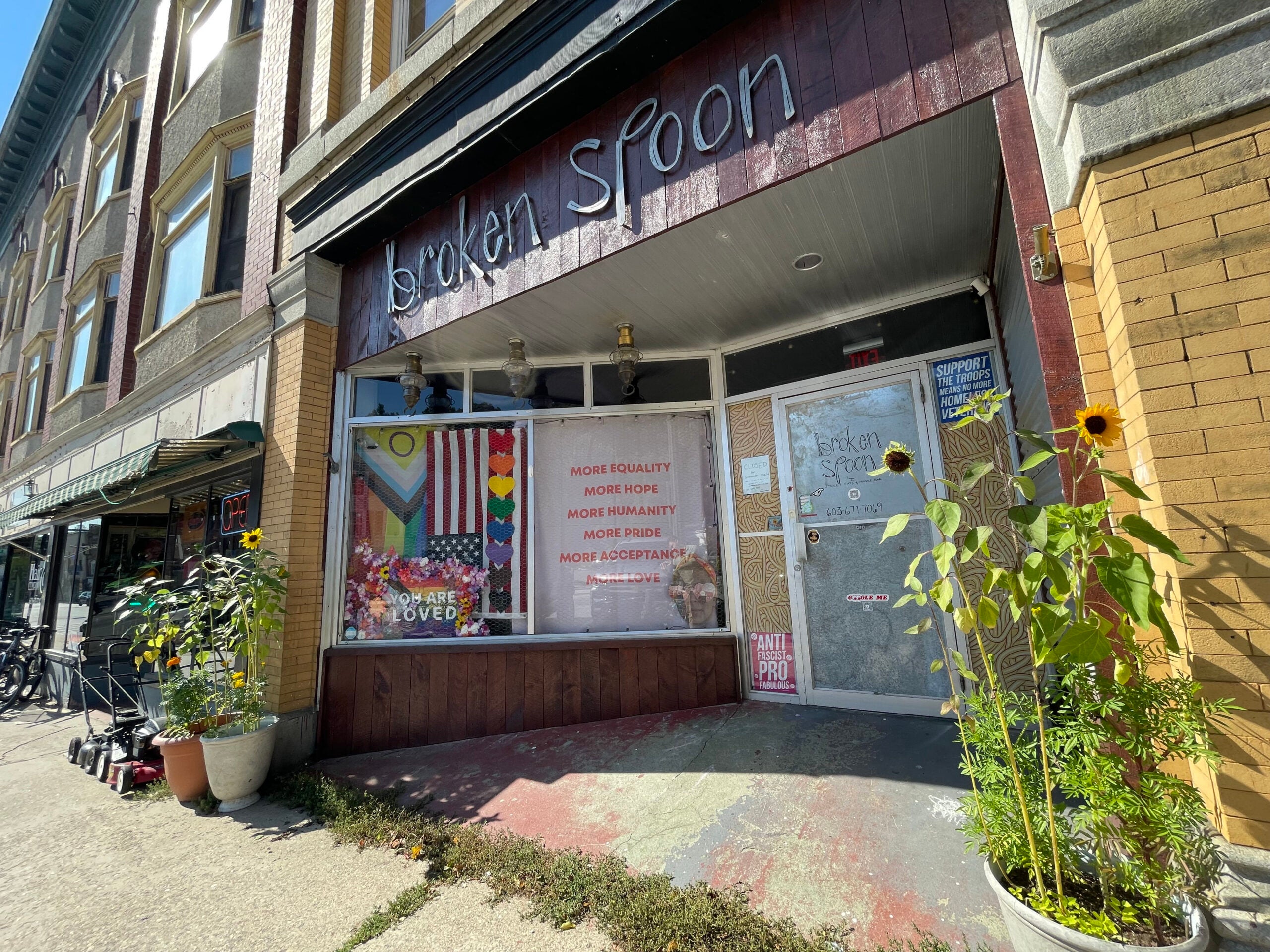The Boston Globe
“If something happens to me, who would I even call?” said the owner of the Broken Spoon, who has been harassed by white supremacists and rebuked by local law enforcement.

FRANKLIN, N.H. — Miriam Kovacs steps outside each day to hang a flag when she opens her restaurant, the Broken Spoon, and she steps outside again each night to take it down when she closes up shop.
Or at least she used to.
For the past couple of weeks, Kovacs has kept the door locked shut and her LGBTQ Pride flag inside. Her twice-daily ritual has been on hiatus and her eatery has been closed since she heard about the fatal Aug. 18 shooting of shop owner Laura Ann Carleton in Lake Arrowhead, Calif., where police said the shooter was a man who had previously made “several disparaging remarks” about a rainbow flag that stood outside Carleton’s store.
Kovacs said she couldn’t help but see similarities between Carleton’s experience and her own. They have both been vocal advocates for inclusion who encountered bigotry and pushback linked to their places of business. With her sense of safety in Franklin already on edge, Kovacs said her flag-hanging routine suddenly felt foreboding.
“That’s two times a day where any lunatic can be sitting in the lot across the street just waiting for their bad day to take it out on me,” she said.
“I don’t know anyone in New Hampshire that’s a bigger target,” she added.
Kovacs isn’t the only business owner in the state to display an LGBTQ Pride flag prominently year-round and to speak out against fascism. Nor is she the only one to be targeted for harassment in recent months by neo-Nazis and white supremacists. High-profile incidents have made headlines this year in Portsmouth and Concord, too.
But unlike her counterparts in larger cities, Kovacs feels wholly unsupported by her local government and police force in Franklin, which is the least populous of New Hampshire’s 13 cities, with 8,800 residents.
“If something happens to me, who would I even call?” she said.
That question isn’t a vague hypothetical to Kovacs. She is genuinely worried about her ability to access public safety services — so much so that she has filed a lawsuit against the city, its police department, and eight city officials, alleging that they have engaged in a civil conspiracy to violate her constitutional rights.
Her relationship with the Franklin Police Department has been strained since at least July 2022. That’s when the Broken Spoon was bombarded with anonymous phone calls and fake online reviews, including some that made antisemitic references to the Holocaust, after she condemned a white supremacist group on social media.
Kovacs, who is of Jewish and South Asian heritage, reported the harassment to the Franklin police. An officer prepared an initial report, but Kovacs said police failed to treat her case with the seriousness it warranted, and she said the response from city leaders has focused more on rhetoric than action.
Her criticism of the department drew a public rebuke from police Chief David Goldstein, who posted a 379-word statement on Facebook in February that named Kovacs and accused her of wrongly implying that the city had taken no action in response to her complaint.
“I welcome honest discourse, even if it runs counter to my own,” he wrote. “But facts are important and should not be ignored because they may be a counterpoint to an expressed opinion.”
Emails reviewed by the Globe show that Goldstein circulated a draft of the statement to City Manager Judie Milner and Mayor Jo Brown and incorporated minor textual edits prior to publishing it with their approval.
Goldstein’s statement was roundly criticized, and Kovacs called it a form of “retaliation.” Weeks later, it was taken down without apology or retraction.
That wasn’t the only action Goldstein took based on his disapproval of what Kovacs had been saying about his department. He also sent a formal disciplinary warning letter in December to Franklin police officer Mark Faro, who is dating Kovacs. Goldstein strongly implied that Faro would have to choose between his romantic relationship and his job.
“I realize that your relationship with Ms. Kovacs presents you with a conundrum,” Goldstein wrote. “However, the challenges presented by your affiliation with Ms. Kovacs are unacceptable as it/they exist and the solution is completely up to you.”
The letter concluded that Faro had violated a department policy that prohibits police personnel from having personal relationships with felons, drug dealers, or others who “might cast doubt on the credibility or reputation of the employee or the department.” The letter didn’t allege that Kovacs had engaged in any illegal activity. Rather, it took issue with her speech alone, claiming that she promotes “anti-law enforcement attitudes and behaviors.”

Faro resigned. He said Kovacs has been pushing for accountability, not advancing an anti-cop message. Now he’s looking for work again, and Kovacs is rethinking the way her eatery interfaces with the public.
“I’m in the process of restructuring my entire business model right now,” Kovacs said. “I’m like a sitting duck in there, you know? So I’m trying to focus on catering and things like that.”
Kovacs is suing Chief Goldstein, Sergeant Daniel Ball, City Manager Milner, Mayor Brown, and four other city officials. Her lawsuit alleges that they engaged in a civil conspiracy to violate her First Amendment rights, including her right to petition the government for redress of grievances.
The lawsuit, which was filed Aug. 29 by Concord-based attorneys Cassandra Moran and Michael Lewis of Rath, Young and Pignatelli, states that Kovacs is concerned about the rise in racism and antisemitism in New Hampshire and beyond, so she spoke out against this hate and sought the protection of local officials. Instead of providing protection, the local government “adopted a policy of retaliatory viewpoint discrimination against her,” Moran and Lewis wrote.
The lawsuit alleges that city police sought to interfere with Kovacs’ plans to meet with the New Hampshire Department of Justice’s Civil Rights Unit. On the day of the scheduled meeting in August 2022, Sergeant Ball called her and falsely claimed that her car registration had expired, and he “warned her not to drive her car that day,” the lawsuit states. (She said she attended the meeting anyway.)
Chief Goldstein and Sergeant Ball did not respond to a request for comment.
Milner declined to comment on the lawsuit’s particular allegations. In an email, she said local leaders and the community “rallied around Ms. Kovacs directly after the incident as well as the few incidents since.” The city council convened a special meeting in August 2022, which led to a city resolution condemning hate and a newly formed anti-hate citizens group that remains active, she said.
Mayor Brown said during a city council meeting Tuesday evening that the city’s legal team is reviewing the lawsuit’s allegations.
“I believe that neither the city nor any of the individual defendants will be found culpable of any discriminatory behavior or action,” she said.
Two of the other defendants, city councilors Valerie P. Blake and Jay Chandler, declined to comment. The other two defendants, councilor Vince Ribas and former councilor April Bunker, did not respond.
The lawsuit alleges that Brown commented on Kovacs’ mental health during public meetings and “assigned” Ribas and Bunker to “monitor” Kovacs and her speech. It accuses Blake, Chandler, and Milner of deriding Kovacs by name during public meetings. And it notes that one official said during a public meeting that Kovacs “looked like a thug” while criticizing police.

Desireé McLaughlin, who’s running for mayor, operates the Central Street Laundromat just a few steps away from the Broken Spoon. She said she has been shocked by the callousness with which city officials have spoken about Kovacs in public.
“I personally think they should resign,” McLaughlin said. “That’s a terrible lack of decorum. … Regardless of your personal feelings, you shouldn’t do that.”
Kovacs’ lawsuit alleges that the defendants intentionally inflicted emotional distress and violated the New Hampshire Right-to-Know law. It seeks unspecified monetary damages and an injunction to block the defendants’ allegedly unconstitutional behavior.
Kovacs said her litigation is about her experience in Franklin but also carries a larger aim: to put leaders in other communities on notice, so they don’t neglect those who report bias and hate-related incidents.
“I’m living the worst-case scenario as to why people are hesitant to call in hate crimes,” she said, “so I hope that whatever the outcome is it makes other jurisdictions take this more seriously.”